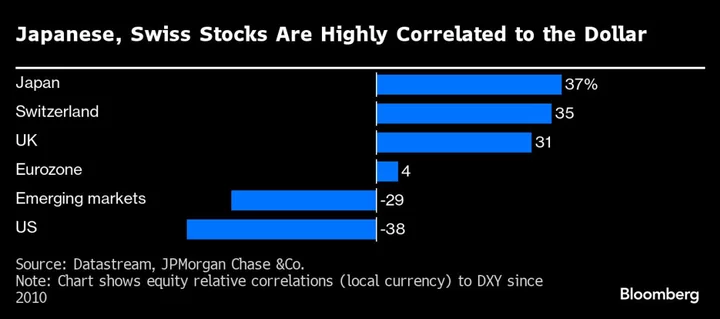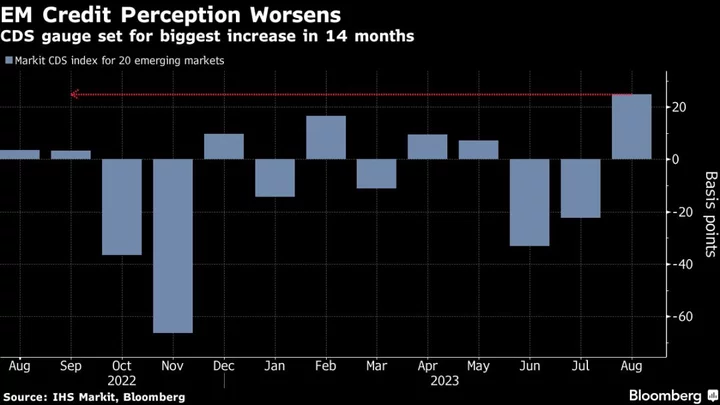Shares of exporters outside the US have been boosted by the earnings impact of a rallying dollar, but that tailwind may be set to reverse.
Exporter-weightings are particularly high in the stock markets of Japan, Switzerland and the UK, suggesting benchmarks in these countries will be among the worst performers if the dollar’s recent pullback gathers pace, according to JPMorgan Chase & Co. Taiwan exporters are also at risk given their high correlation with the greenback, Societe Generale SA says.
Bloomberg’s gauge of the dollar is heading for its worst month since July after the Federal Reserve signaled its almost two-year long tightening cycle may be coming to an end, spurring traders to add to bets on interest-rate cuts next year. Indexes of Japanese and European exporters as well as many of their Asian peers have fallen from their recent highs after rallying in the first eight months of the year.
A weaker dollar would erode the competitiveness of exporters based outside the US by making their products more expensive in the world’s largest economy — a key market for many. At the same time, about 40% of global trade is invoiced in dollars, meaning the impact is much broader than just sales to the US.
“Global exporters who have not hedged their FX exposure could be affected by US dollar weakness as it would not only impact the pricing competitiveness of their products but also could lead to translation losses and drag down earnings,” said Daryl Liew, head of portfolio management at SingAlliance Pte.
Japanese stocks have had a relatively high correlation of 37% with the US currency since 2010, while Switzerland is close behind on 35% and the UK on 31%, JPMorgan equity strategists including Mislav Matejka and Prabhav Bhadani wrote in a note late last month. In contrast, the reading for emerging markets is minus 29%.
About half of the revenue for Nikkei 225 Stock Average members comes from outside Japan, and the figure rises to 84% for the UK’s FTSE 100 Index constituents, according to JPMorgan.
Japanese exporters have benefited from the yen’s slide over the past year, but the currency looks set to be pushed higher by the weaker dollar and also by signs the central bank is relaxing its control over local bond yields.
“If the dollar continues to weaken, investors might need to turn underweight” on Japan’s automobile and biotech industries to achieve outperformance, Morgan Stanley strategists including Gilbert Wong in Hong Kong wrote in a research note Tuesday.
Toyota Motor Corp. has said it gained an extra 45 billion yen ($299 million) in operating profit for every 1 yen of additional weakness against the dollar. Ten of Japan’s biggest companies are likely to pocket an extra 1.4 trillion yen in profits this fiscal year if the yen remains around its current level of 150 per dollar, a Bloomberg calculation shows.
Taiwanese exporters have been the most sensitive to the dollar within emerging Asia as the island has the biggest exposure — along with South Korea — to international revenue, said Rajat Agarwal, Asia equity strategist at Societe Generale in Bengaluru.
Estimates Decline
European firms with a high proportion of exports to the US are already seeing their profit forecasts marked down amid concern about the direction of the dollar and global growth.
Analysts’ 12-month forward earnings projections for Swiss chocolate maker Nestle SA, which gets more than a quarter of its revenue from North America, have dropped 1.5% since October. UK consumer brand Unilever Plc also saw a slide in profit forecasts last month. The firm gets more than 20% of its revenue from the US, data compiled by Bloomberg show.
Weakness in the dollar has the potential to add to the volatility in global equities and can “erode the margins for export-oriented names outside the US,” said Prerna Garg, equity strategy associate at HSBC Holdings Plc in Hong Kong. “A fall in dollar can further dampen their earnings, particularly when global demand remains lukewarm.”
(Adds data on international exposure in seventh paragraph.)









